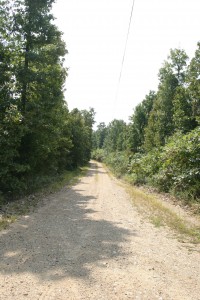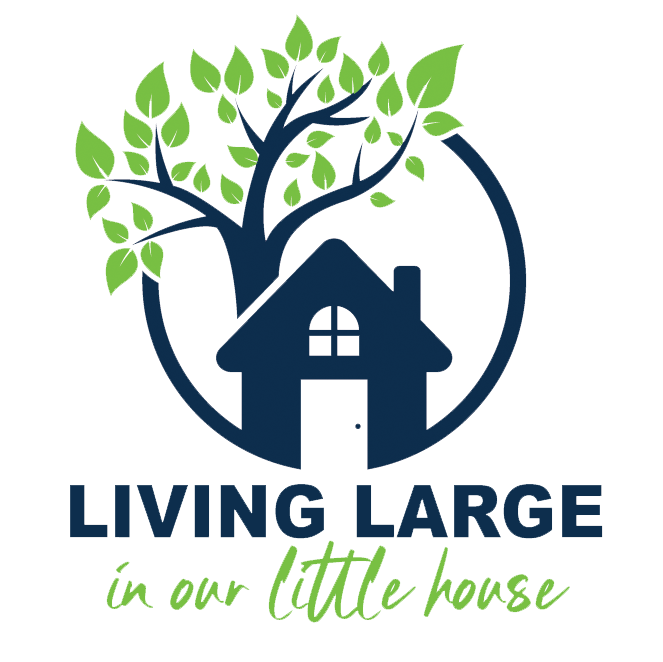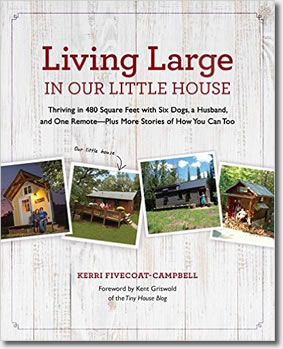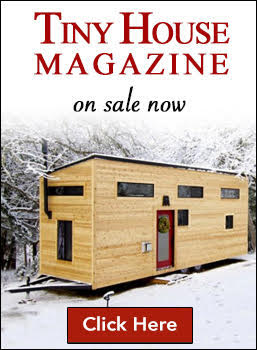Changes Across the Road
Changes and fear of the unknown.
We’ve experienced both here at Our Little House this week. My aunt placed 15 acres across the road from us for sale; that has brought us both the fear of the unknown and will ultimately bring change.
When my mom, aunt/uncle and sister looked at these 30 acres of land 29 years ago, the real estate agent actually tried talking them out of it, telling them it was “too far out” and would “never be developed.”
It’s what my family wanted in a piece of property, but how wrong that real estate agent was, all of the surrounding land that wasn’t Corps of Engineer owned was sold, and the area began developing in earnest in the late 1980s into the 1990s.
A neighbor (neighbor is a relative term here since she lives more than two miles up the mountain) tells me sometimes how sad it makes her to come down our road now and see the electrical lines and the road widened for the traffic.
They bought their house in 1986, not long after my family purchased this property, but long before my aunt had the lines run to her new home for electricity. Our neighbor and her husband used to take long and quiet walks down our road through undeveloped wilderness.
I know that feeling as I’ve experienced it with each new home that is built or every new resident that’s brought more traffic down our road.
What our neighbor does realize is that if my family hadn’t ran that first electrical and phone line down this road, another would have. She’s thankful that at least someone with a factory turkey farm (there are so many in this region) didn’t buy the land and she’s happy that at least we’ve tried to maintain as much of the natural forest as we could; that we’ve been respectful in leaving as small as a footprint as possible.
I posted here on Tuesday about a friend of mine who bought a small weekend cabin. I fielded some negative comments on the blog and on the Facebook page about my encouraging people to develop unspoiled wilderness to follow their dreams (a hater who claims religious moral indignation even stalked my friend’s email address and found it necessary to send her some anonymous hate mail, which is why we’ve removed all references to her identity).
It might be the green eyed monster of envy that sparked these responses, but just maybe a couple of these readers have somehow missed the point of this forum.
We do encourage people to follow their dreams, but advocate leaving as small of a footprint on the earth as possible.
J. did not buy undeveloped land and build a McMansion on it, she saved for six years and bought a small cabin that was already there and I know by her convictions on living sustainably that no other person will be better suited to care take that land.
We advocate for people like J. to buy existing small homes or build them, if that’s what they want to do, because that certainly is preferable to developers who want to split the land into subdivision plots for McMansions (as happened at the top of our mountain 3 years ago), factory farms or fracking companies who will rob the earth of its resources and leave it poisoned with tons of chemicals.
Even as we’re faced with our own fear of the unknown and changes here at Our Little House, we will continue to encourage people who dream of living a life outside of the city in a small home to do so, whether they can do it full time or part time, as long as they aspire to leave as small of a footprint as possible.
As my neighbor up the road saw 30 years ago and as we are seeing across the road now, the land will be sold anyway. It’s the price we pay as a society that encourages hard work to follow our dreams of homeownership, which IMO, is still better than in the countries where homeownership is a dream most people will never know.
I only hope that by encouraging responsible development, Karma comes full circle and we get a neighbor (instead of several in a subdivision) who also shares the same respect for our earth and for the land we so love here.
Is your dream to have a small cabin in the woods and if so, do you think you should follow it if you can?









I love and agree with Pamela’s comment. For me, there’s a fine line between underdevelopment and overdevelopment. I always think about places I used to love, such as Telluride and Jackson Hole and environs, that have crossed the line. Respect for nature is paramount.
Change is hard. I grew up in a small farming community. Unfortunately, that small farming community is just an hour outside of San Francisco. As home prices escalated in the Bay Area, people began snapping up rural land, building fancy homes, and commuting. What a different community it is, now.
I hope that the person who buys that property sees fit to keep it as close to its natural state as possible. And that regulations prevent subdividing and building multiple homes!
So far, we don’t have any such regulations, even those that would prevent the unnecessary erosion of the mountainsides into the prestine lake. But I do hope only one person, who is not interested in developing, buys that land.
When I see remote areas being developed I hope that the people understand the responsibility that comes with their stewardship of the land.
I go a little crazy when people dream of the wild life and then complain that roads aren’t developed enough or it takes too long to go shopping or to find consistent internet.
Here in my part of NY state, we have an ag district disclosure. Why? Because people moved upstate from the city and were shocked (shocked, I say) to discover that dairy farms smell. 🙂
To me, living on rural property means dealing with wild animals and fires. Living in the city means engaging with your neighbors. And living on a boat means protecting the water you live in.
I hope your new neighbors share your ethos of living lightly.
I have to admit, Pamela, that I have complained about the commute to even get to a decent grocery and about the internet. 🙂 But you’re right, it is a trade off. I’m not sure we could live with neighbors really close to us again (and we may have to find out). But with everything comes responsibility. Even people in the burbs have a responsibility to ensure they are not using toxic chemicals on their lawns and allowing those chemicals to run into storm water drains, which ends in rivers and streams.
I had not realized that your family had occupied the land for decades (in one way or another). I know that feeling of seeing areas slowly developed. When we first moved into our old house it was a newer area, with lots of farms and fields surrounding. Then, one weekend, a traffic light went in a 1/4 mile away. We knew that “infrastructure” signaled the beginning of the end of the wide open spaces. And, over 18 years, sure enough, the area is built up, dense. We moved 5 months ago…same city, but to an “older” neighborhood that was developed some time before our former newer one.
That is definitely a plus of moving to an older neighborhood. Should we ever move back to the city, it would be to an older small home in an established neighborhood.
I’m so sorry you had to deal with negative comments. You do a lot of good with your beliefs and definitely do not advocate waste and over-building. Living in a place that makes you feel good – as long as you’re not hurting anyone in the process – is priceless.
Thanks, Sheryl.
I don’t guess you can afford to buy the 15 acres or you would as I’m sure that’s your preference as it would be mine.
I have ten plus acres here in southern ‘Bama and we use two for our home and businesses and eight is left for the wildlife. It’s a wetland area so it would cost a mint for someone to come in and fill in for development and that is frowned on by the EPA now. (although, they don’t seem to care about the bees dying..nuff said there)
Hopefully someone will buy the land who will treat it with respect and love and permaculture/organic ways and leave it better than good.
Until the human population slows it’s own growth to a trickle, nature will continually be taken over and destroyed more times than we care to think about. I cringe at my age of stb 65 at what is in store for my grown children/grands/g.grands. 🙁
No, unfortunately, we cannot afford the land, Deborah. Sigh.
We have a little different situation here where I am. We have such a lack of water I don’t see much development until changes are made in how water is supplied here. Of course, the areas closer to San Antonio and Austin thought that too and development there is running wild. Our area has also undergone changes in the last couple of hundred years. Overgrazing, lack of fires that used to be set purposely, and extreme drought have caused the changes. What used to be rolling grassy hills with areas of oaks and cedars is now being taken over by cedar (ash juniper). The overgrazing caused the little topsoil that was here to be washed away without the grass roots to hold it. Now when it rains the water doesn’t soak into the ground to replenish the aquifers but runs off. Where there used to be grass there is now cedar. So our land isn’t the same as it once was. It will take many years of work to restore it. I’m not sure it will ever be done due to the magnitude of what it requires.
As with you and others, our place used to be for weekends etc. We always knew it would be our retirement home. We are small, not tiny (464 sq ft cabin with 160 sq ft guest house for the kids to visit). We try to live in harmony and we will spend the rest of our lives trying to help our 54 acres retain more water.
I have also been surprised by some of the rude and hateful comments people make about others trying to live small/tiny and how some think its never enough no matter what you do.
And as you say, if your aunt hadn’t put the electric lines in someone would. We hope that new neighbors will live as much in harmony as we all can and that they will respect what brought them there in the first place. And not turn it into a big city suburb with huge houses just like what they left. Unfortunately, any beautiful place with water available is eyed by developers drooling over the money they can make. I hope you get some good neighbors that will be good friends and take care of the land. Sometimes these folks are what is needed to keep the land as beautiful and peaceful as it is. Just leaving it emply leaves it open to a worse fate. You, your friend that just bought the “used” house, and all others of like minds make good caregivers of the land. It can’t make it any more on its own usually. Too many that want to pave paradise.
Water shortage is definitely not a problem here. And yes, the rude comments are bewildering, but most of them I chalk up to envy.
Yeah, I have to admit I’m not particularly “nice” to people who come to our area and add huge houses / barns, etc. (I mostly ignore them.) It’s tough to see an area developed. We actually live in the first house built when our valley was subdivided back in the 1970s. I like to think buying a “used” house, as some of the snooty people call them, is MUCH better than building from scratch. Maybe I’m just kidding myself. ;o)
If the land is being developed, Roxanne, it’s you or someone else who will buy. Just like around here when land goes up for sale. It’s going to sell anyway, it might as well be someone who cares about the land and surrounding environment. Recycling is recycling, no matter if it is trash, animals or houses. 🙂
My husband and I are buying a small house on 1.5 acres of land in the Hoosier National Forest area of Southern Indiana. It is really in the middle of nowhere for me because I was raised in Chicago. I am so excited!I have always wanted to live in the country and am so looking forward to living in the middle of nature.
Congratulations, Louella! Please keep us posted on your new move and home!
Change does come no matter where you live I guess. I grew up in a rural area. My parents’ home is now surrounded by many more homes. I’m sorry you had negative responses to your post. I admire what you do here and you have always talked about sustainability and small footprints so I don’t understand what anyone could complain about.
Thanks, Brette.
I certainly resonate with all of this, being one who has long had a vision of having a remote place in the beauty of the region (a dream from my upbringing in the state, even)–but I will never forget how utterly stunned I was several years ago when I made a trip back to my beloved Eureka Springs and could not believe my eyes at all the development on the outer fringe of the town. At least the town is so land locked that it prohibits much in the way of development, but I was truly sick to my stomach at having to plough through all of that just to get into the village!
We are, of course, experiencing this, too, in rural Carroll County (and the little town of Carollton, an hour south of here, as the fracking explosion has found its new epicenter in my region. The former chair of our local chapter of The Sierra Club lives right in the MIDDLE of it, poor man! When I first moved to Canton 18 years ago, it had more beautiful golf courses than I could ever imagine in a small city–and now the most beautiful one has been raped of all of its mature trees to build new homes. Ah, change…we just never know or can imagine. But, my dream lives on, whether I will ever have a chance to actually realize it or not remains to be seen. I’m only 65–hmmm, how much longer do I get to try? 🙂
Completely agree with your assessment of Eureka Springs. We’ve been going there since we were kids and it certainly has developed since, as has Branson. Hey, Benjamin, 65 is the new 45, you still have *plenty* of time! 🙂
I’ll never EVER lose the vision, I can tell you that much! Grrrr….